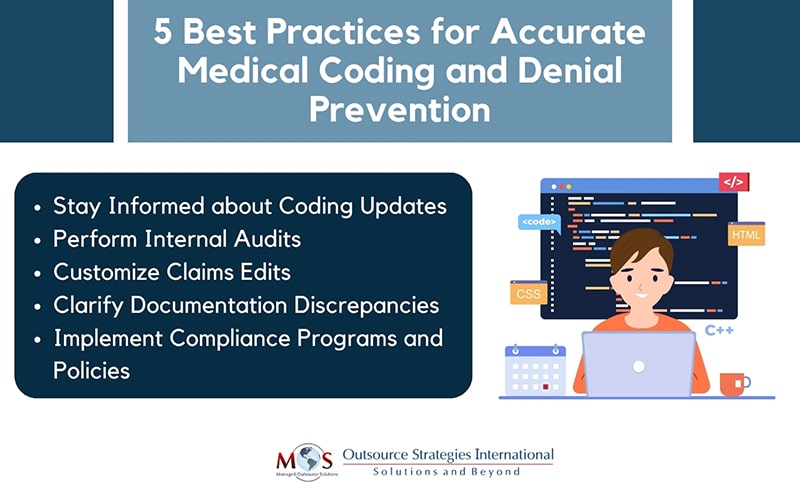A key component of revenue cycle management (RCM), medical coding involves converting medical services, diagnoses, procedures, and equipment into codes for claim submission. Accurate and compliant coding is necessary to minimize denials and for providers to receive prompt and appropriate reimbursement for patient care. Accurately translating medical documentation into appropriate codes requires expertise and many providers are turning to professional medical coding services to report their services correctly on claims.


Minimize denials and maximize revenue with our coding and billing services!
Claim Denials – A Costly Challenge for Healthcare Providers
The escalating challenges and financial implications of claim denials pose a significant burden for healthcare providers. And denials are on the rise. In December 2023, Fierce Healthcare reported on studies which found that a rise in claim delays and denials is “wreaking havoc on providers’ revenue cycle performance and contributing to health systems volatile accounts receivable and diminishing cash reserves”.
Claim denials strain operational efficiency and lead to delayed reimbursements, impacting the financial stability of healthcare organizations. Denials also impact provider-payer and provider-patient relationships. Frequent denials strain relations with payers, leading to stricter contracts and closer scrutiny of future claims. Denials also erode patient trust and satisfaction, particularly in the digital era where reputation is influenced by social media. Preserving provider-patient relationships is crucial in today’s economic climate.
Accurate coding plays a key role in generating clean claims every time.
Impact of Coding Errors
RCM covers the entire process of managing a healthcare facility’s financial transactions, from patient registration and insurance verification to claims submission, payment posting, and collections. Payers rely on the codes submitted on the claim to determine the appropriate reimbursement for healthcare services rendered. Appropriately assigning CPT codes, HCPCS codes, ICD codes, DRG codes, HCC codes, and modifiers on claims the first time around is crucial for prompt and accurate payment and RCM success. Inaccurate codes or codes that do not align with the documented services will lead to delayed payments or denials and lost revenue.
Medical coding errors can be broadly categorized into “fraud,” which refers to intentional misrepresentation, and “abuse,” defined by the AMA’s Principles of CPT® Coding, ninth edition, as innocent mistakes resulting in falsification that remains nonetheless representative. An instance of abuse might include coding for a more complex service than performed, resulting from a misunderstanding of the coding system. Errors in coding that can lead to denials include:
- Assigning the wrong CPT code
- Unbundling codes
- Upcoding
- Not checking National Correct Coding Initiative (NCCI) edits when reporting multiple codes
- Not linking the ICD-10 codes
- Not appending modifiers or inappropriate modifier use
These coding errors can have severe financial consequences for a medical practice, resulting in significant lost revenue and compliance concerns that may subject it to audits.
Role of Compliance in Minimizing Denials
Compliance with coding and payer guidelines and regulations promotes accurate and ethical coding practices. Many claim denials can be prevented with proper data management and correct coding.
Here are some key considerations for compliant coding:
Adherence to Coding Guidelines
The American Medical Association (AMA) and the Centers for Medicare and Medicaid Services (CMS) provide specific rules and instructions for assigning medical codes. It is crucial for coding professionals to closely follow these guidelines to ensure accurate code assignment and documentation.
Regulatory Compliance
Numerous regulations, such as HIPAA (Health Insurance Portability and Accountability Act), The No Surprises Act, The False Claims Act, the Anti-kickback Statute dictate coding and billing practices. Compliance with these regulations helps ensure that claims are properly coded, billed, and reimbursed according to the specific rules and policies of each payer. Not staying up to date on new coding rules and initiatives is a costly mistake that can result in lost revenue and potential compliance risk.
Avoiding Fraud and Abuse
Accurate coding prevents fraud and abuse within the healthcare system. Examples of fraudulent coding, as listed above, include upcoding (assigning higher-value codes than warranted) or unbundling (separately billing components that should be billed together). These practices can lead to substantial financial penalties and legal repercussions.
Documentation Integrity
It is reported that 42% of coding denials are the result of incomplete documentation. Accurate coding relies on comprehensive and precise documentation from healthcare providers. Proper documentation supports the appropriate assignment of codes and ensures that billed services accurately reflect the care provided. Compliance with documentation requirements helps prevent coding errors and denials, supporting the integrity of the coding process.
Strategies for Achieving Accurate and Compliant Coding
Here are 5 best practices to achieve medical coding accuracy and prevent denials:
Stay Informed about Coding Updates
Assigning obsolete, missing, or incorrect codes lead to claim denials. This can happen if coders don’t stay up to date. Every year, numerous new and modified codes are introduced, taking effect on October 1 for ICD-10-CM/PCS and on January 1 for CPT and HCPCS code sets. For instance, the 2024 CPT edition that came into effect on January 1 contains 349 changes, including 230 additions, 49 deletions, and 70 revisions. Additionally, code updates are released every quarter throughout the year. Staying up-to-date is necessary to ensure accurate coding and compliance. Regular education and training programs help coding professionals informed about coding updates, industry best practices, and any changes in regulatory requirements.
Perform Audits
Performing internal coding quality audits can identify factors that are causing revenue leakage. Conducting systematic reviews is the best way to assess the accuracy, completeness, and compliance of medical coding and documentation. This can help identify and non-compliance with coding guidelines and regulations. Additionally, audits can reveal repeating issues which may be due to under-and over-coding, use of repetitive and obsolete codes, non-compliance, and poor documentation. Maintaining a proficient coding workflow that integrates frequent checks and feedback loops can swiftly recognize and address coding discrepancies.
Customize Claims Edits
Claims edits are automated checks that review reimbursement claims for errors, inconsistencies, or potential problems that could lead to claim denials or payment delays. Customizing claim edits allows organizations to create their own rules or modify existing ones in the claims editing system. It involves setting up specific rules to address their coding and billing needs, such as checking for correct code combinations, following medical necessity guidelines, complying with documentation requirements, and more. This customization helps organizations align the editing rules with payer requirements, geographical considerations, and specialty-specific coding and billing guidelines.
Clarify Documentation Discrepancies
Clear and comprehensive documentation is crucial for coding professionals to accurately assign numerical codes to diagnoses and procedures. It helps minimize ambiguity and reduces the chances of misinterpretation and coding errors. Effective communication between clinical and coding teams is essential for prompt clarification of any discrepancies or uncertainties in the documentation and reducing the challenges of the appeals process. Coding professionals should identify gaps in the documentation and query the provider to close those gaps prior to submitting the claim to the payer. Regular internal audits of medical documentation can help identify areas that require improvement.
Implement Compliance Programs and Policies
Compliance programs serve as a proactive approach to identify and rectify coding errors before they lead to potential fraud. A robust compliance program would include policies and procedures that guide adherence to ever-evolving coding guidelines and regulatory requirements. Compliance programs can ensure that patient diagnoses and treatments are correctly documented, facilitating appropriate reimbursement while maintaining accurate medical records.
To mitigate the impact of coding errors on delayed payments, denials, and lost revenue, it is crucial to prioritize accurate and compliant coding practices. This includes ensuring thorough documentation, staying updated with coding guidelines, investing in ongoing training for coding professionals, and leveraging technology solutions that support accurate coding.
Partnering with a professional medical billing and coding company can ensure expertise and access to advanced technology. These companies have dedicated teams of certified coders and billing specialists who are trained and experienced in translating medical documentation into billable codes. Partnering with an expert is a practical approach to boost coding accuracy and minimize denials.






